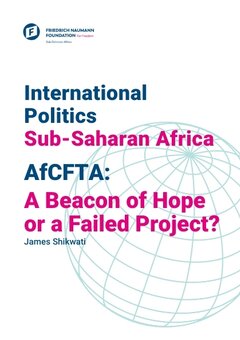AfCFTA
A Beacon of Hope or a Failed Project?

A person working in container area logistics transportation import export or shipping industry, delivery and logistics concept container truck transport or free-zone area
© ShutterstockThe establishment of the AfCFTA is a major milestone in a six phased implementation plan of the of regional integration outlined in Article VI of the 1991 treaty in Abuja Nigeria that created steps towards an African Economic Community. The AfCFTA was launched on January 1, 2021, and by September 2022, 54 countries had signed the agreement while 43 countries had deposited ratification instruments. The implementation of the agreement is gradual to accommodate least developed country members. AfCTA aims to spur industrialisation and prosperity in Africa through intra-Africa trade by eliminating 97% of tariff lines on goods and services. The quest for a unified continent dates to May 25, 1963, when Ethiopian Emperor Haile Selassie hosted independent nations at that time to establish the Organization of African Unity. The outfit’s membership grew to the current 55 under the current African Union that took over from the Organization of African Unity in 2002.
Challenges Facing the AfCFTA
One of the major hurdles facing the AfCFTA is the issue of distrust, which has deep historical roots stemming from colonialism and the subsequent exploitation of African economies. The legacy of disrupted trade networks and imposed economic systems has led to a pervasive lack of trust amongst African nations. Overcoming this barrier requires a concerted effort to rebuild trust through collaborative initiatives and shared economic benefits.
Another challenge lies in the non-innovative nature of Africa's private sector, particularly its Micro, Small, and Medium Enterprises (MSMEs). Hindered by limited access to finance and a focus on survival rather than innovation, African businesses struggle to compete on a global scale. To address this, there must be a shift towards fostering innovation and value addition within the private sector, drawing inspiration from successful models such as Germany's MSME-driven economy.
Furthermore, the overlapping memberships across African Regional Economic Communities (RECs) create inconsistencies and hinder the integration process. Resolving these conflicts and streamlining regional cooperation is essential for the success of the AfCFTA. Additionally, informal trade, characterised by undocumented cross-border transactions, poses a challenge to formalising intra-Africa trade and realizing its full potential.
Infrastructure deficiencies, inadequate transportation networks, and border facilities further impede the implementation of the AfCFTA. Addressing these shortcomings requires significant investment in infrastructure development, which remains a critical priority for the continent. Moreover, the over-reliance on external partners for support and funding raises concerns about sustainability and the alignment of interests.
Opportunities for Success
Labor standards and climate change present additional challenges, highlighting the need for comprehensive policies that address social inequalities and environmental sustainability. Fragility within Africa's RECs further complicates the integration process, requiring concerted efforts to foster stability and cooperation amongst member states.
Despite these challenges, the AfCFTA holds immense promise for Africa's economic future. By prioritising the activation and recalibration of the continent's private sector, incentivising informal trade, and addressing infrastructure deficiencies, Africa can unlock its full economic potential. Moreover, strategic partnerships with countries like Germany can provide valuable expertise and support in navigating the complexities of regional integration.
Realising the vision of the AfCFTA requires proactive measures to overcome existing challenges and capitalise on its vast opportunities. By fostering trust, promoting innovation, streamlining regional cooperation, and addressing infrastructure gaps, Africa can chart a path towards sustainable economic growth and prosperity for its people. The journey ahead may be challenging, but with determination and strategic collaboration, the AfCFTA can become a transformative force for the continent.
Download our latest analysis, Evaluating the African Continental Free Trade Area by James Shikwati for the Friedrich Naumann Foundation for Freedom in Sub-Saharan Africa.
James Shikwati is the founder director, Inter Region Economic Network, Kenya and publisher of The African Executive Online Weekly Magazine

